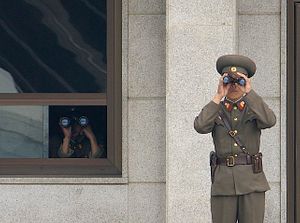Representatives from the two Koreas sat down Friday in the North Korean border town of Kaesong, the site of a jointly-operated industrial zone. Little concrete progress was expected to come from the meeting. However, the two sides did decide to extend the talks into a second day, which is as big a success as could be hoped for.
The vice-minister level talks started Friday morning with South Korea’s vice minister of unification Hwang Boo-Gi meeting with his North Korean counterpart, Jon Jong-Su.
The talks come after months of work, efforts to claw back to some level of stability after August’s flare-up. The August crisis — in which two South Korean soldiers were injured by a North Korean mine and South Korea subsequently decided to resume propaganda broadcasts — had many regional watchers worried the situation could slip further into conflict. But South Korea stopped the broadcasts and North Korea apologized after Kim Kwan-jin, South Korean President Park Geun-hye’s national security adviser, and Hwang Pyong-so, a top military aide to Kim Jong-un, held negotiations in late August.
In late November, the two sides reaffirmed their intention to continue to engage in dialogue and agreed to hold the December 11 talks.
Friday’s talks lacked an actual agenda but the South Koreans were expected to bring up North Korea’s previous promises to restart regular reunions of families separated by the war. The Korea Herald reported that the North Koreans were keen to restart tours to Mount Geumgangsan — a tourist region in North Korea established in 2002 but suspended by the South Koreans in 2008 when a woman was shot by a North Korean soldier.
Opening remarks from both side seemed hopeful.
“Despite the winter’s cold weather, let’s make utmost efforts to bring the spring sun to the North-South relations,” said Jon, according to the Korea Herald. For his part Hwang said “The distrust and confrontation, meanwhile, have only deepened and the barriers grown higher. Let’s bring them down, plug the gap and open the grand path.”
North Korea’s nuclear program is unlikely to be on the table for discussion, as Kim Keun-Shik, a professor at the University of North Korean Studies in Seoul, put it to the AFP, “The North’s denuclearization needs to be seen as the ultimate goal of inter-Korea dialogue, not a pre-condition of it.” A report from a KCNA claims Kim said recently that the work of Kim Il-sung “turned the DPRK into a powerful nuclear weapons state ready to detonate a self-reliant A-bomb and H-bomb to reliably defend its sovereignty and the dignity of the nation.” Jeffrey Lewis told Reuters, “I think it’s unlikely that they have an H-bomb at the moment, but I don’t expect them to keep testing basic devices indefinitely, either.”
The opening statements lasted 30 minutes and the two sides broke for most of the day, with the chief delegates reconvening in the evening for a second session. Reports indicate that the talks will resume on Sunday.

































